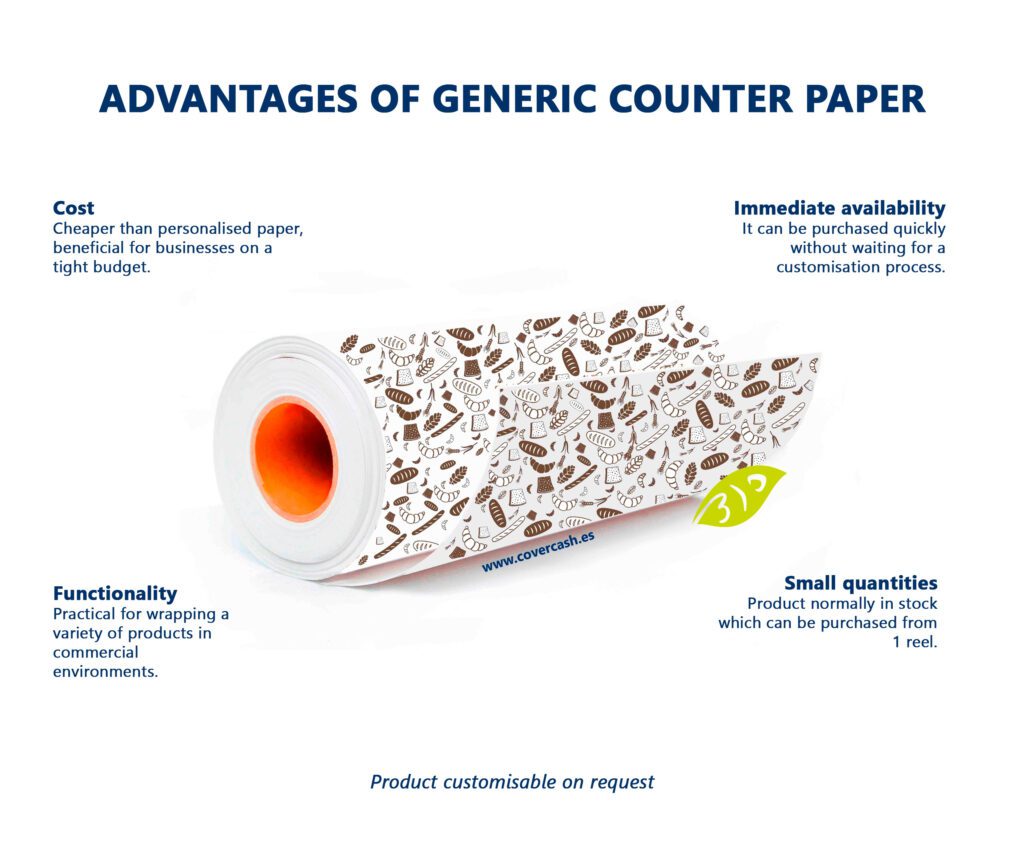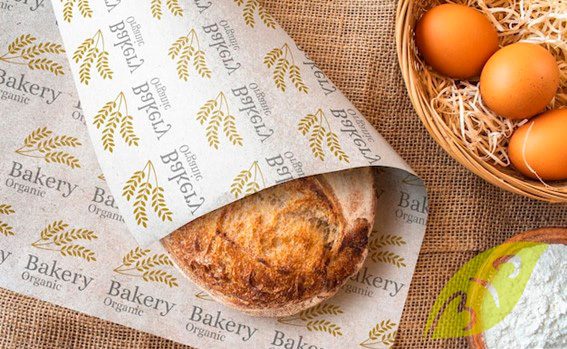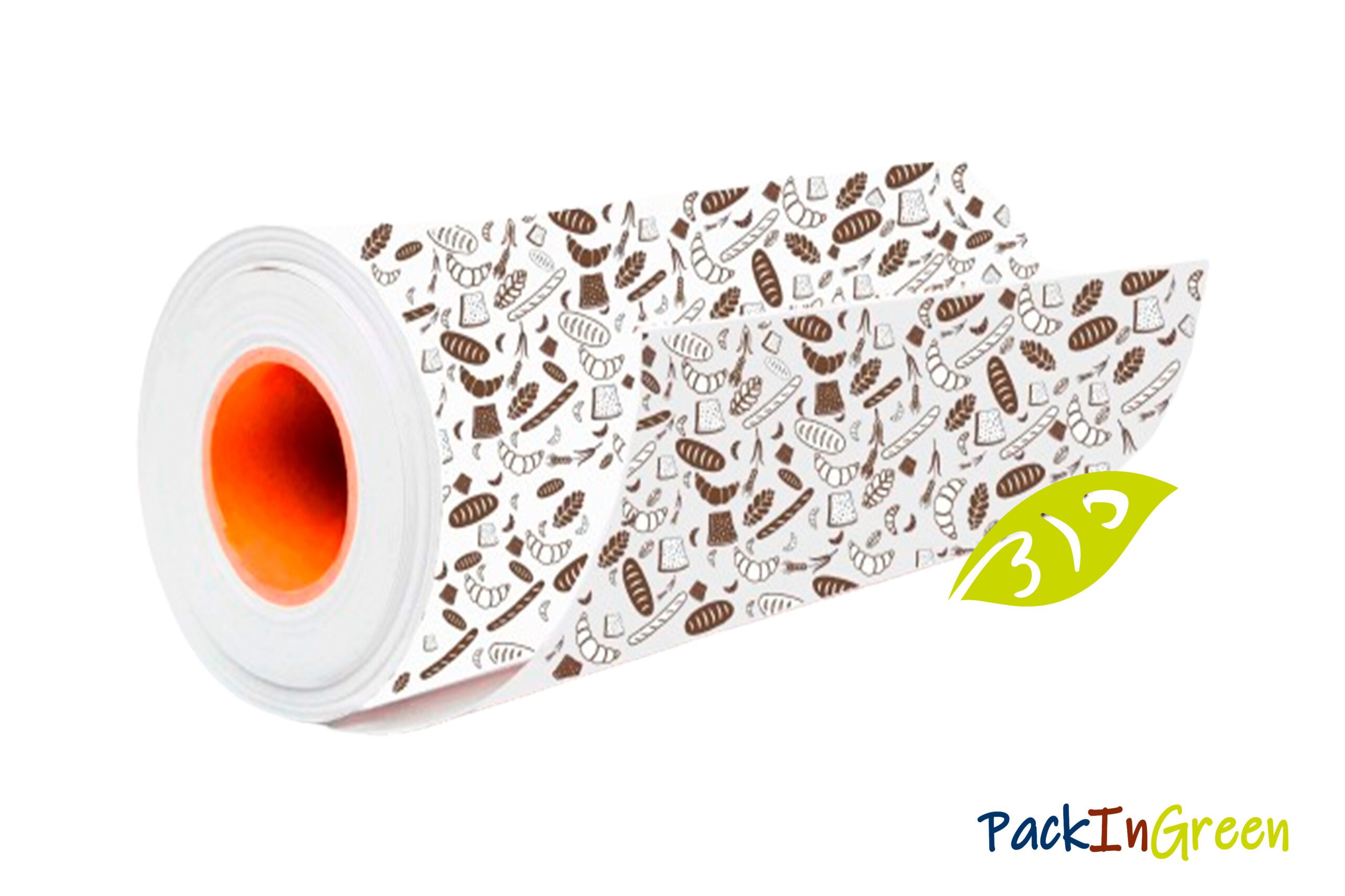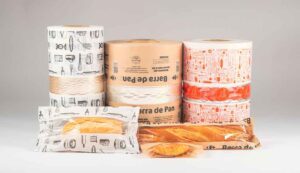What is counter paper?
Counter paper is a type of paper used in commercial environments, especially in retail shops and restaurants, to wrap food, products or packaging for delivery or presentation to customers. It is usually a strong paper that is easy to handle.
In the food industry, hygiene is of particular importance when it comes to meeting customer expectations. Counter rolls add a distinctive and personalised touch to the packaging of baked goods in bakeries, patisseries and take-away establishments. These rolls are ideal for wrapping, protecting and serving a wide range of products such as: cakes, breads, pastries, pastries, etc., as well as covering trays, thus guaranteeing the integrity of the food during transport and maintaining an optimum standard of hygiene for the end consumer.
Our reels are made from top quality virgin paper. They are made from 40-gram white cellulose paper and have a generic printing for bakery and confectionery. The white paper colour is ideal for wrapping trays of sweets and is reusable and recyclable as well as biodegradable and compostable.
What is it used for?
It is used to manually wrap both purchased items and bakery or pastry products in a quick and hygienic way, providing a clean and professional presentation, thus complying with food safety regulations. It can also be used to line presentation trays or to protect work surfaces, among other uses in the commercial environment.
Typical sectors and applications
Some of the most common sectors in which this type of paper is used include:
- Food industry: Ideal for bakeries, bakeries and food shops to cover and protect foodstuffs such as napolitanas, pastries, bread rolls, doughnuts, muffins, sandwiches, paninis or pizza slices, ensaimadas… and maintain their integrity during transport and storage.
- Catering industry: In events and catering services, counter paper is used to wrap sandwiches, sandwiches and other food to go.
- Food to go: Counterfoil is widely used in the packaging of food to go because of its ability to keep food warm and fresh.
- Agricultural and horticultural industry: In agriculture, counterfoil is used to wrap and protect plants, flowers and produce during transport and sale in markets and garden shops.
- Retail trade: Many retail businesses use counter paper to wrap products sold in shop, especially in places such as gift shops, markets…
In addition to its use as counter paper in retail environments, it has a variety of other uses due to its strength and versatility. Some of these uses include:
Writing and drawing: It can also be used as a stand for writing or drawing with pencils, pens, chalk or other media. Its smooth and resistant surface makes it ideal for taking notes, sketching or creating illustrations.
Gift wrapping: It is a trend to use it as a rustic and elegant alternative to traditional wrapping paper. Its natural look and its ability to be decorated with ribbons and other embellishments make it popular for creative gift wrapping.
Packaging and protection: It can be used as a packaging material to protect fragile items during transport or storage. It can also be used to line boxes or wrap objects that need extra protection.
Craft and DIY projects: It is a popular material for craft and DIY projects due to its strength and ability to be cut, glued, painted and decorated in a variety of ways. It can be used to make cards, labels, event decorations, book wrapping and more.
Interior decoration: It can be used as a background for murals, posters, noticeboards and other decorative elements in the home or in commercial environments. Its neutral colour and texture add a rustic and cosy touch to any space.
Product advantages
- The paper reinforces the sustainable image of the brand by reinforcing the perception of an artisan or ecological product.
- Suitable for manual wrapping.
- Cut to the size you need. Optionally you can purchase the reel holder.
- Recyclable, biodegradable and compostable.
- Suitable for contact with food.

Generic printing for bakeries
These rolls feature a generic print designed with specific motifs such as loaves of bread, ears of wheat, flour or pastries such as croissants, for use in bakeries, bakeries and pastry shops, making them ideal for serving napolitanas, rolls, doughnuts, muffins, sandwiches, pizza slices or paninis, sweets and ensaimadas, among other foods, in a hygienic way.
This model, made from 40-gram white cellulose paper, is available in standard sizes with a width of 310 mm (4 kg) and 620 mm (8 kg).
The white colour of the paper not only provides a clean and professional presentation, but also offers the versatility of being reusable and recyclable. In addition, being biodegradable and compostable, our paper helps to reduce environmental impact, providing a sustainable solution for food packaging.
Customise your counter paper rolls
You can customise the printing and paper weight from 30-35-40-50-60 grams, in white or brown, and reel widths of 310-500-620 on a minimum order of 150kg.

Benefits of personalisation:
- Brand promotion: customising the counter paper with the brand’s logo, name or colours helps to increase brand recognition among customers. Every time a customer sees the personalised counter paper, they will remember the brand and associate that experience with it.
- Professionalism: Personalised counter paper gives an image of professionalism and attention to detail. It shows that the business cares about its image and is willing to invest in small details to enhance the customer experience.
- Differentiation: In a competitive market, personalised counter paper can help differentiate a business from its competitors. A unique and attractive design can capture the attention of customers and make the business stand out.
- Communicating specific messages: In addition to the logo or brand name, customised counter paper can include promotional messages, product information or any other relevant content. This allows the business to effectively communicate with customers while wrapping their products.
- Customer loyalty: A personalised counter paper can create an emotional connection with customers. When a business shows attention to detail and offers a personalised experience, customers may feel more valued and be more inclined to return in the future.




